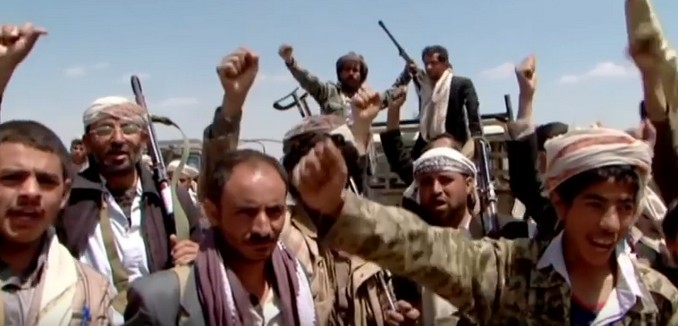A United States admiral said that Iran is smuggling increasingly sophisticated weapons to Yemen’s Houthi rebels threatening Saudi Arabia, The New York Times reported Tuesday.
According to Vice Adm. Kevin Donegan, who headed the U.S. Navy’s Fifth Fleet which operates in the Middle East, Iran is arming the Houthis with what the Times described as “an increasingly potent arsenal of anti-ship and ballistic missiles, deadly sea mines and even explosive boats that have attacked allied ships in the Red Sea or Saudi territory across Yemen’s northern border.”
“These types of weapons did not exist in Yemen before the conflict,” Donegan observed. “It’s not rocket science to conclude that the Houthis are getting not only these systems but likely training and advice and assistance in how to use them.”
Donegan’s accusation is consistent with the findings of Conflict Armament Research (CAR), a British organization that studies the transfer of weapons around the world, published in December of last year that explained that weapons seized from smugglers indicate “the existence of a weapon pipeline extending from Iran to Somalia and Yemen, which involves the transfer, by dhow, of significant quantities of Iranian-manufactured weapons and weapons that plausibly derive from Iranian stockpiles.”
In October of last year, an Iranian diplomat admitted to Reuters that there had been a “sharp surge in Iran’s help to the Houthis in Yemen” during the previous five months. “The nuclear deal gave Iran an upper hand in its rivalry with Saudi Arabia, but it needs to be preserved,” he added.
In Who Are the Houthis and Why Do They Shout “Death to America”?, published in the August-September 2017 issue of The Tower Magazine, Julie Lenarz, a senior fellow at The Israel Project, provided this brief history of the ties between Iran and the Houthis.
The Houthis, officially called Ansar Allah, are a homegrown organization that originated in northern Yemen in the 1990s and has fought against Yemen’s governments on and off since 2004. When Salafists began preaching the Saudi brand of Wahhabi Islam in Yemen, the Houthis formed a counter-movement in defense of the Zaidi tradition that had informed Yemeni culture for centuries.
In part because of Saudi Arabia’s allegiance with the United States, the Houthis adopted a strident anti-Western rhetoric that originated in Iran and is frequently revoked by its Lebanese terror proxy Hezbollah. “God is Great, Death to America, Death to Israel, Damn the Jews, Victory to Islam” – the credo of the Houthis can be found smeared with graffiti on mosques and other public institutions across Houthi-controlled territory.
The stark similarities in rhetoric have led to the Houthis being portrayed as an Iranian-backed Shia insurgency group. Yet until war broke out in Yemen in 2011, the Houthis were not characterized in sectarian language by the local population nor were they known for ties to the Islamic Republic. Unlike the Iranian regime, the Houthis do not adhere Shia Twelver Islam that is predominant in Iran, but follow the school of Zaidi Islam, similar to the Hanafi school of Sunni Islamic jurisprudence.
For quite some time, allegations of Houthi-Iranian cooperation were therefore overblown backed up only by scant evidence. However, circumstances have since changed and Iran’s hand in the civil war in Yemen and its attempt to project power on the Arabian Peninsula can no longer be denied.
[Photo: Documentary House 2.0 / YouTube]




